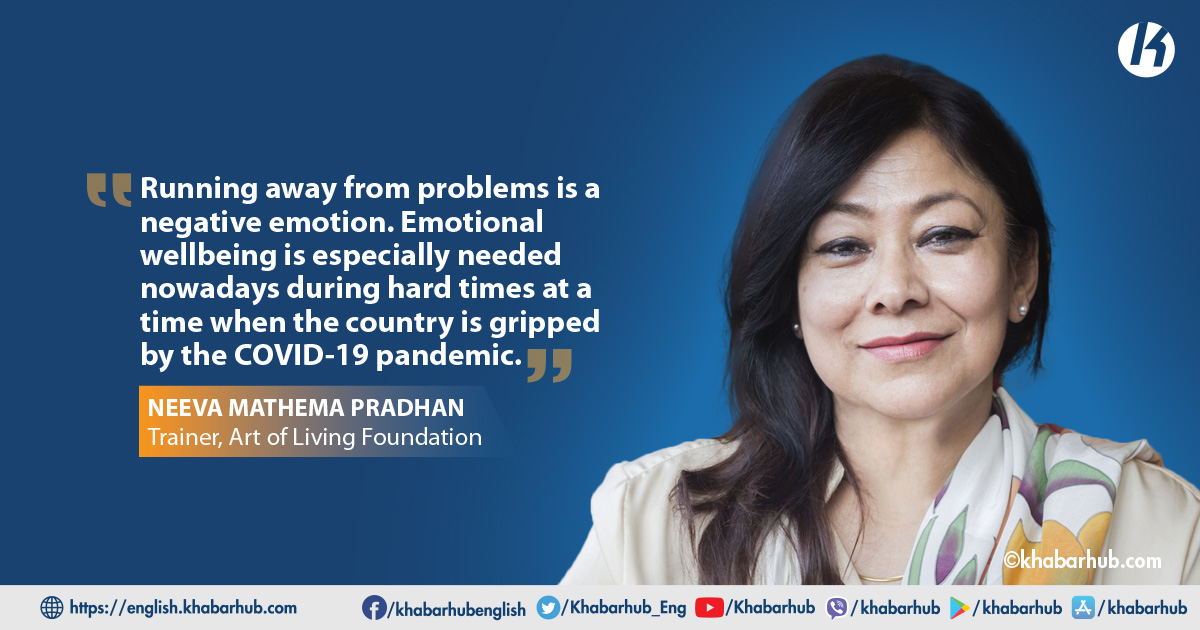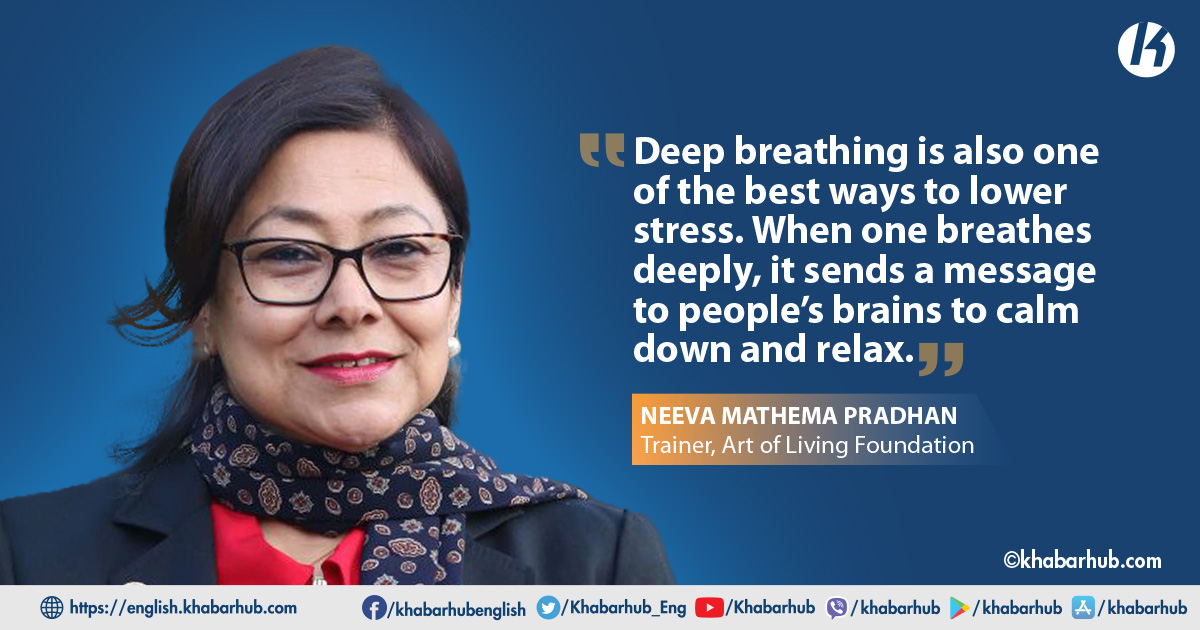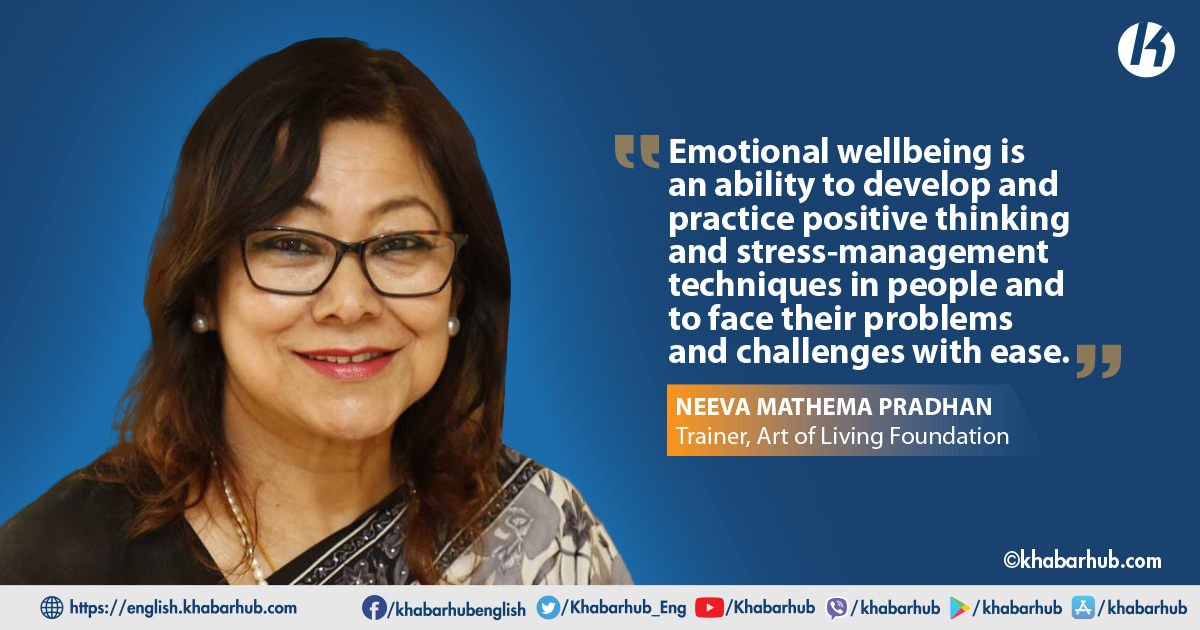Stress is truly a normal part of life. Every individual is under some kind of stress. At times, it also serves a beneficial purpose. It sometimes can motivate people to get a handle on their stress. However, when there is tension, there is definitely a solution.
A person’s ’emotional wellbeing’ reduces stress, says Neeva Mathema Pradhan, an instructor under the Art of Living Foundation. She worked in the banking sector in the United States for fifteen years. Credit and loan was her field of work.
She says she had to undergo work stress in her mind. Meanwhile, she received training in stress management, and eventually became an international instructor. Khabarhub talked to her about stress management. Excerpts:
You talk about ’emotional wellbeing’. What exactly is it?
An individual has his/her feelings. Emotional well-being can also be conceptualized as a balance of feelings – both positive and negative — experienced in one’s life as well as his/her perceived feelings — both happiness and satisfaction.
Emotional well-being refers to the emotional quality a person experiences. When a person’s body and mind are in a good state, he/she experiences positive thoughts.
When a person has good physical health and emotional wellbeing, he/she feels stable and content. If the body and mind are not in a good state, a person feels lazy, and leads to negative thoughts.
Therefore, emotional wellbeing is vital to develop positive thinking and to face people’s problems and challenges while running away from problems is a negative emotion.
Emotional wellbeing is important especially during a tough time, for instance, during the COVID-19 pandemic or a crisis.
A person with stable emotions can solve his/her problems. Therefore, people need to be emotionally strong, and that emotion should be under his/her control. Only then, a person has a lot of energy and self-confidence. Such a person can easily cope with the COVID-19 crisis.
According to a study conducted by UNICEF, the depressive index among Nepali youth has increased by 40 percent. It is also more common in women. People are becoming frustrated these days. Suicides are reportedly increased. Emotional wellbeing saves people from depression.
Who do you think needs emotional wellbeing during hard times, particularly during the COVID-19 crisis?
The front-line workers, particularly health workers, need emotional wellbeing at this time of the pandemic. They do not have time to think about themselves.
Moreover, they are equally stressed with the fear that they may bring the virus to their family when they come home from the hospitals. We have been providing emotional wellbeing training for frontline health workers training for over a year now.
This has had a positive effect on them. Health workers, doctors and nurses, are working in a difficult environment. Several members of a single-family have been infected. And they cannot even see one another.
This has also put health workers at a disadvantage. Therefore, emotional wellbeing is needed for health professionals. We have been working for emotional well-being through the Art of Living Foundation.
Psychologists and psychiatrists talk about ‘mental health’ and link suicide with depression. What’s the connection between what they call ‘mental health’ and what you call ’emotional wellbeing’?
Emotional wellbeing precedes mental health. If an individual’s emotions are not healthy, then there is no question of emotional well-being.
The lack of emotional well-being leads to mental health. Emotional wellbeing is the process by which a person needs to examine himself/herself before he/she becomes depressed, find out the state of his/her emotions, and raise awareness accordingly.
People also need to know the state of emotional wellbeing to comprehend where exactly their mind is heading. We make people understand to know the level of their emotions in the training.
Our training teaches a person how to avoid or reduce stress. It’s not just about not taking stress, it’s not just about reducing it, it’s also about knowing how to do it. We teach that way.

Could you tell us a bit about breathing or breathing exercise techniques? What is the relationship between stress management and breathing?
Stress brings negative changes in our emotions. Breathing changes according to the emotion that comes into your mind. Breathing, emotion and mind – all these three things are closely related.
Breathing is different when one’s mind is happy, or when the mind is unhappy, when the mind is nervous, or when the mind is in pain or sad. A person can easily experience such a difference. If there is no emotional well-being, breathing will be quite different.
Breathing in such a situation is neither complete nor comfortable. The state of a person’s mind or emotions is understood from his/her breathing. If emotional well-being is good, breathing will not change much.
How does deep breathing (practice) help in stress management?
When you take a deep breath, a lot of oxygen goes into the lungs, and diffuses into the blood. In normal breathing, the lungs cannot inhale sufficient oxygen. With a few minutes of inhaling and exhaling, oxygen reaches 80-90 percent of the lung capacity. The lungs must be strong to increase immunity.
Eighty percent of the stress in our minds comes from breathing. When you take a deep breath, the tension inside the heart comes out. People should be taught how to breathe in and out. As you know, breathing is the first and last action of human life.
When a person is born, he takes his first breath and this process of breathing continues throughout his life. After the last breath, there is no life, and the breath goes out.
Records have shown that a person can live up to 40 days without food, but he cannot live for four minutes without breathing. Failure to breathe for four minutes will lead to brain death. The human mind is often unstable.
The mind will try to act whatever it says. If I asked you not to remember the white monkey, you would try to recall it even more. We call the mind ‘let go’, that is, leave the mind wherever it goes. Body and mind concentration do not match. When it comes to walking, our legs take one step after another, but the mind seems to be scattered.
Such a scattered mind can be brought together through the breathing process. The mind scattered in the past, future and present can be brought into the present. When the mind is present, stress is reduced.
A mind makes many excuses. It sometimes goes beyond the borders. Happiness keeps distancing itself. This happens when the mind cannot hold on to the present.
When we talk about stress management, we put more emphasis on the corporate level, and ‘Leadership and Stress Management.’ What is the importance of stress management in this area?
The efficiency of an employee having stress decreases. He/she cannot fulfill his responsibility well, and cannot satisfy the clients. If the person in the leadership cannot manage the stress, he may make an inappropriate decision. The company may suffer a loss.
If a person goes back to the past, he will feel remorse. If you think more about the future, there will be fear, restlessness, and stress in your mind. People with this condition have less awareness. If there is no awareness, the work will deteriorate.
That is why we place more emphasis on stress management in the corporate and business sectors and run workshops for them collectively. We don’t just give lectures, we teach practical stress management. We help to heal the mind.
Generally, there are three dimensions in a person’s life, personal life i.e. family life, social life and professional life. How can a person balance these three dimensions?
When a person is free from stress, his mind becomes, in a way, vibrant. The person will act more responsibly. When there is no confusion in the mind, he can balance his time accordingly – time for his family, his happiness, his business responsibilities, and the time for everyone in the society.
When there is no stress in the mind, the power of communication increases. An individual also increases his work ability and skill. When communication is good, people adjust the practical situation to suit everyone.
When a person is unable to balance the dimensions of his responsibilities in his life, he automatically becomes stressed. So we have to be careful. A stress-free person is always alert.
How do you describe ‘mindfulness’?
Mindfulness is awareness. When you wake up in the morning, you are happy to remember your work and responsibilities for the day and if you think of accomplishing it, you are alert. You have mindfulness.
And, if you think that you have a lot to accomplish, or think about the country’s political situation, or political instability, then one cannot fulfill his/her responsibility well.
You get stressed all day long. Such a state is not a state of mindfulness, not a state of awareness. If there is no awareness, people may suddenly start screaming leading to damage. The person later regrets and becomes even more stressed.
This is why we emphasize mindfulness. If you are suddenly stressed because of work or someone’s behavior, you need to be more mindful. Therefore, deep breathing works. Sit in silence for a while, and take a deep breath and release, for about two to three minutes. By doing this, one becomes alert and responsive.
Then one can calm down and express his/her reaction without any aggression. You will then be able to make a decision. And you have no regrets.

The Art of Living Foundation has a large-scale campaign. But what does Art of Living exactly mean?
This is also called the art of living. It basically involves mindfulness and meditation. It involves breathing patterns and stress management. It also includes yoga. It is for everyone from teenagers to young and elderly.
Our bodies, souls and minds are interconnected. The mind relaxes only when the body is relaxed. If there is a disease in the body, the mind becomes restless and leads to stress.
Stress management is also called preventing health care. Stress management helps to control high blood pressure, diabetes, cholesterol, etc. The Art of Living teaches the art of living at the level of the body and the level of the mind. It includes how to keep life in the present and how to stay calm.
Could you elucidate what exactly ‘recharge and focus’ mean?
We should understand that charge is energy. Energy is stored in a phone battery when it is charged. Similarly, since our body too needs energy, it needs to be recharged. Stress management, yoga, and meditation make our body energetic by recharging.
The emphasis should be focusing on the task at hand. We can focus on work only after recharging. We call this condition ‘recharge and focus’. This recharge and focus are required in every dimension of human life.
Recharge and focus will help an individual to focus on the present.
How did a student of management and a professional banker, and a person who practiced mass communication and journalism, becomes a motivational trainer?
I worked in the banking sector credit and loan department for 15 years. Later, I was asked to look after the training as well. During such work, I used to get stressed. I used to come home with the stress of office work. Then I received training in stress management. I learned to calm down by relieving stress.
After returning to Nepal, I started training for stress management in consultation with my friends in the banking sector. Since such training proved to be effective, the demand increased, and we started giving training to people in other professions as well. This was how I made my entry into this sector.

We help to develop individual leadership skills. We teach things like how to be a good inspiration leader, how to be a good communicator, as well as team-building techniques.
Intending to give something to society, I started doing what I knew with passion and perseverance. I am currently affiliated with various social service organizations. I also started this work with the inspiration of my father.
What are the three main things that a person, no matter who he/she is, should pay attention to manage stress?
One: First of all, you have to understand the tendency of your mind. Understanding your mind, you need to bring it to the right track.
Two: Focus on breathing techniques. Sit in a quiet place and take long, deep breaths, and exhaling for around 10 minutes. It brings awareness to the mind. This also reduces stress.
Three: We need to realize the circumstances and move forward by accepting the people, objects, and circumstances.
These three actions create harmony in the body and mind. Man can only change himself. You cannot change what you do not have. If one understands this, it can definitely reduce stress.









Comment